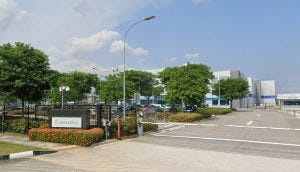
In the latest example of pandemic-related collaboration, Novartis is prepping to make the drug substance for Roche’s Actemra (tocilizumab), currently being investigated as a treatment for severe COVID-19-associated pneumonia.
Novartis has signed an initial agreement with fellow Swiss pharma giant Roche to reserve capacity and implement a tech transfer for the drug substance production of Actemra (known as RoActemra in Europe) from its site in Tuas, Singapore.
Actemra, a monoclonal antibody first approved in the US for rheumatoid arthritis (RA) in 2010, pulled in global sales of CHF 2.9 billion ($3.15 billion) for Roche last year – a 32% increase on the year prior driven by COVID-19.

Novartis is prepping to make Roche’s Actemra from its Tuas, Singapore site
“During the pandemic, the demand for Actemra has been increasing at a global level for both approved indications such as RA and the non-approved treatment of COVID-19 associated pneumonia,” Roche spokesman Karsten Kleine told Bioprocess Insider.
While Actemra is not approved to treat COVID-19 in any country, the mAb is in various Phase III clinical trials to investigate its safety and efficacy in COVID-19-associated pneumonia. In the past year, the firm has supplied doses to the US Department of Health and other governments as a potential treatment.
“In order to ensure an equitable distribution across the globe, Roche is constantly evaluating the evolving situation including local demand and responding accordingly with our supplies,” Kleine said.
“We have been working urgently to increase manufacturing capacity and supply by ramping up our own production network, as well as actively collaborating with external partners to maximize production of Actemra/RoActemra wherever possible with the goal of increasing available supply globally.”
According to a US Food and Drug Administration (FDA) review from 2013, Roche manufactures the drug substance for Actemra from its facilities in Oceanside and South San Francisco facilities – both in California – and its site in Singapore. Roche also harnesses its Chugai Pharmaceutical subsidiary to produce the drug.
Neither Roche nor Novartis would comment on how much capacity would be reserved, nor the financials of the deal. Also there was no indication as to whether the Novartis capacity would be solely used for COVID-19 efforts or to supply Actemra for its various approved indications.
Collaborative efforts
According to Novartis, this deal has the potential to be in-line with its commitment to support industry’s efforts against COVID-19.
“Across the industry, we are sharing our scientific findings, our research and our manufacturing capacity,” a Novartis spokesperson said.
“Since the beginning of the pandemic, we have sought to contribute to the global effort against the virus. Our first priority has been to continue delivering our transformational medicines to the patients who need them, and we have gone to extraordinary lengths to overcome the barriers that the pandemic has created, while keeping our people safe,” we were told.
“But the pandemic has also spurred an unprecedented level of collaboration across the pharmaceutical industry, with businesses using their collective innovation power and global footprint to end the pandemic as quickly as possible.”
Unlike many of its peers, Novartis does not have its own COVID-19 vaccine or therapy in development. Instead, it has leveraged its manufacturing network as a third-party to support others.
“In this context, in March, Novartis announced an initial agreement to manufacture the mRNA and bulk drug product for the COVID-19 vaccine candidate CVnCoV from CureVac to aid in the fight against the COVID-19 pandemic in a new high-tech production facility at the Novartis site in Kundl, Austria,” the spokesperson said.
“And in January, an initial agreement with BioNtech was also signed to provide manufacturing capacity for a COVID-19 vaccination at the Novartis site in Stein, Switzerland.”
About the Author
You May Also Like

schedl_b_and_w.jpg?width=100&auto=webp&quality=80&disable=upscale)
schedl_b_and_w.jpg?width=400&auto=webp&quality=80&disable=upscale)






